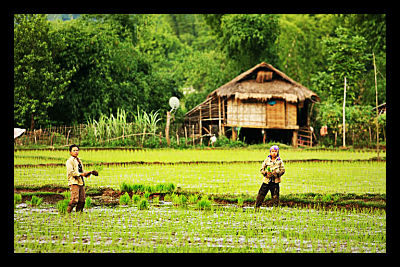Global Poverty Could End by Giving Women Land

Why Women?
A lack of distinct land ownership laws leads to poorly cultivated land and hungry families who are forced to work as day laborers or indentured servants. This weighs even more heavily on women, who are rarely given the opportunity to act as a land owner. In addition to benefiting the women themselves, recent studies have shown that giving land rights to women can have a direct impact on the elimination of global poverty.
Women Can Bring Home The Bacon Too
Rural women play a large part in agricultural production. According to the UN, women workers are involved in fisheries, agro-forestry, and wild-harvesting systems. They work along-side men to produce commercial crops, manage livestock and grow vegetable gardens. However, women also have the added burden of caring for their families.
Despite their crucial work in both production and family well-being, rural women are often under recognized laborers. Most rural women are unpaid or highly underpaid. This means that rural women frequently work in “unofficial” or informal agricultural settings. In India alone, 34% of informal women’s employment is made up of unpaid agricultural work. In Egypt, the percentage comes in at a staggering 85% compared to the 10% for men. Furthermore, many institutions do not recognize or define rural women’s work as economically active employment.
However, the UN is now calling for the economic empowerment of women as a means to combat global poverty. Economic empowerment can first come through the recognition of women’s land rights. Land ownership leads to greater respect, status and increased decision-making power for women.
Research indicates that land ownership can lead farming communities to reinvest in improving their production. This no doubt contributes to greater food security alongside increased welfare for individual families. Research also indicates that when women have land rights, there is an even greater improvement upon food security and hunger. This is largely due to the fact that women are more likely to focus on sustainable crops for their families as opposed to the riskier cash crops that are exported out of the nation.
Women with rights to their own land are also more likely to have a higher status and higher income within their community. This kind of empowerment enables women to make decisions that ensure improved nutrition for themselves and their children. Additionally, women with higher social standings are also likely to be healthier themselves. The effect of such is increased infant survival rate and higher birth-weight children. In fact, research on child malnourishment in Nepal suggests that infants born to mothers that own land are half as likely to be born critically underweight.
Ultimately, increased support for land rights coincides with Millennium Development goals to reduce poverty. But more importantly, land rights give hard-working rural women a chance to better enjoy the fruits of their labor.
– Grace Zhao
Sources: The Christian Science Monitor UN
Photo: Declan McCullagh
